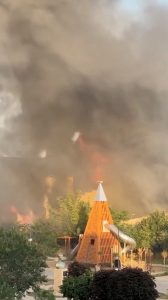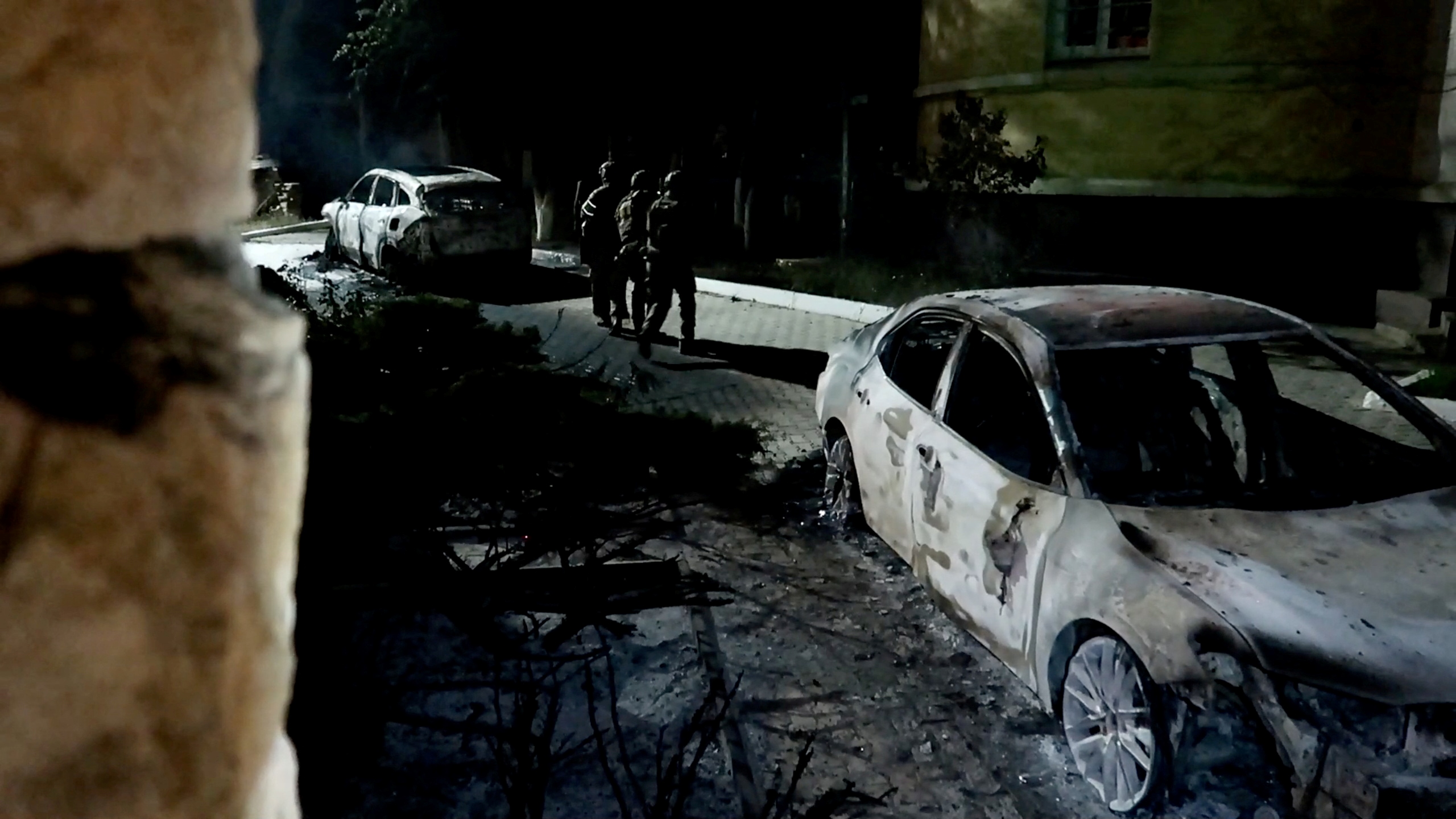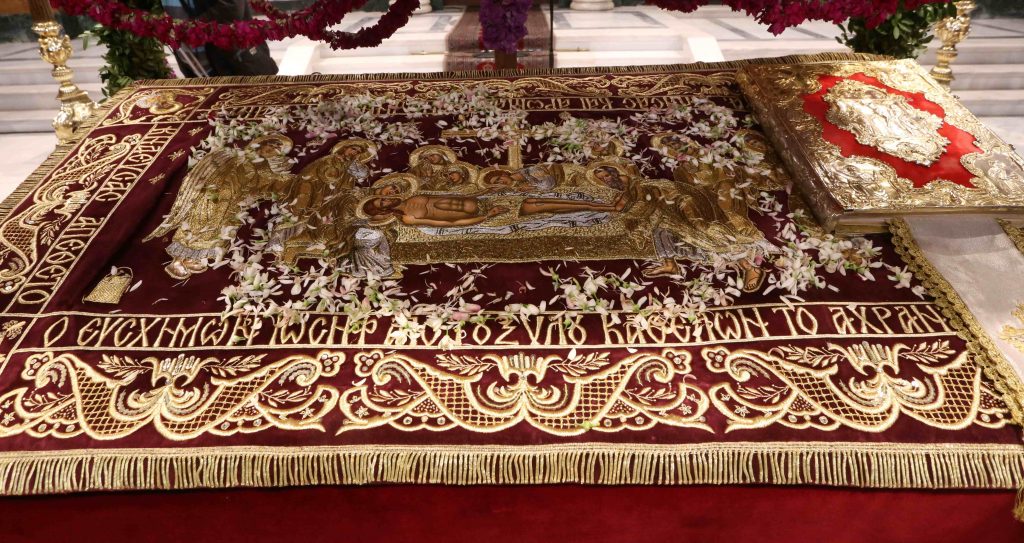Fifteen police officers were among the dead from attacks Sunday on a synagogue, police station and two churches in Russia’s restive North Caucasus republic of Dagestan, the latest incidents in a trend of rising violence across Russia in the past year.
Russian authorities said four civilians had also been killed in the attacks, in which assailants with automatic rifles opened fire on houses of worship in the republic’s capital of Makhachkala and the city of Derbent, in apparently coordinated attacks. Russian authorities said the attacks were carried out by followers of an international terrorist organization, without giving further details, the TASS state-run news agency reported.
Dagestan governor Sergei Melikov called for calm as a manhunt unfolded on Sunday evening. Four gunmen were later killed in a shootout with police, according to TASS.
Fifteen police officers were among the dead from attacks Sunday on a synagogue, police station and two churches in Russia’s restive North Caucasus republic of Dagestan, the latest incidents in a trend of rising violence across Russia in the past year.
Russian authorities said four civilians had also been killed in the attacks, in which assailants with automatic rifles opened fire on houses of worship in the republic’s capital of Makhachkala and the city of Derbent, in apparently coordinated attacks. Russian authorities said the attacks were carried out by followers of an international terrorist organization, without giving further details, the TASS state-run news agency reported.
Dagestan governor Sergei Melikov called for calm as a manhunt unfolded on Sunday evening. Four gunmen were later killed in a shootout with police, according to TASS.
“Panic and fear is what these non-humans were banking on first and foremost,” Melikov said in a post on the Telegram app. “They won’t get that from Dagestanis!”

A view shows plumes of smoke rising, in Derbent, Russia, June 23, 2024, in this still image obtained from a video. VIDEO OBTAINED BY REUTERS/via REUTERS THIS IMAGE HAS BEEN SUPPLIED BY A THIRD PARTY.
Sunday’s attacks raise concern about the vulnerability of Russia’s internal security as critics have blamed authorities for diverting resources toward cracking down on political dissent at the expense of targeting homegrown terrorist threats.
Senior Russian officials have accused Ukraine and the West of trying to foment instability inside the country.
Video shared on social media from Makhachkala Sunday showed a police vehicle on fire and smoke rising from what witnesses said was the synagogue in Derbent. According to TASS, fire services had managed to extinguish the flames by late Sunday evening, but half the synagogue was seriously damaged by the fire.
Gunmen also opened fire on a police car in the village of Sergokala, south of Makhachkala. Some of the assailants attempted to flee by car, police said. Thirteen police officers and three civilians were taken to be hospitalized, according to TASS. In Makhachkala, a Russian Orthodox priest was killed, and the attackers also killed a security guard.
Russia’s National Anti-Terrorism Committee said late on Sunday that the active phase of the counterterrorism operation had been completed in Derbent, TASS reported.
Russia has a long and bloody experience with terrorist attacks, most of them in the wake of the Kremlin’s two wars with separatists in Chechnya, the Muslim-majority region in the North Caucasus. Sunday’s attack underscores the country’s continued vulnerability to interethnic and religious violence.
Dagestan, also Muslim-majority, in particular has been the site of several bombings and other attacks over the years, which Moscow has blamed on militant Islamic fighters.
Many of the homegrown extremists who threatened Moscow left the country in the mid-2010s to join Islamic State in Iraq and Syria. But one branch of Islamic State that has been revived and found sanctuary in Afghanistan, ISIS-Khorasan, has launched new attacks on Russia.
In March, the group carried out a deadly attack at a Moscow concert hall, killing more than 140 people and wounding hundreds more. Last week, Russia said its security forces stormed a detention center in the southern city of Rostov-on-Don and killed six men linked to Islamic State who had taken two guards hostage there.
Dagestan and the broader North Caucasus region have also seen a rise in antisemitic incidents since the start of the Israel-Gaza war in October. Weeks after the Hamas attacks, a mob stormed Makhachkala airport in anticipation of a flight arriving from Israel. Hundreds of people, some chanting antisemitic slogans and waving Palestinian flags, rushed onto the landing field to seek passengers on a flight from Tel Aviv.
None of the Israelis on the flight was harmed. Muslim leaders in Dagestan condemned the incident and the Israeli government at the time demanded that Russia protect Israeli citizens and Jews wherever they are.
Following Sunday’s attacks, the president of the Jewish Communities of Russia, Rabbi Alexander Boroda, called on the country’s Jewish communities to remain calm.
Russia’s Commissioner for Human Rights, Tatyana Moskalkova, said the attacks had been orchestrated to incite interethnic and religious hatred. “I hope that the terrorists will get the punishment they deserve,” Moskalkova wrote on Telegram.



